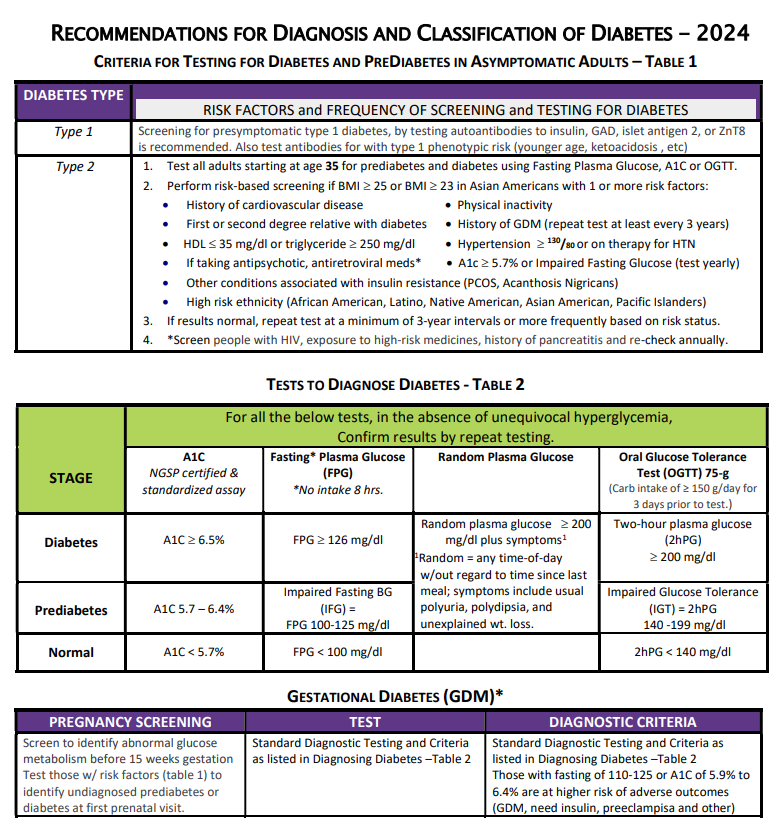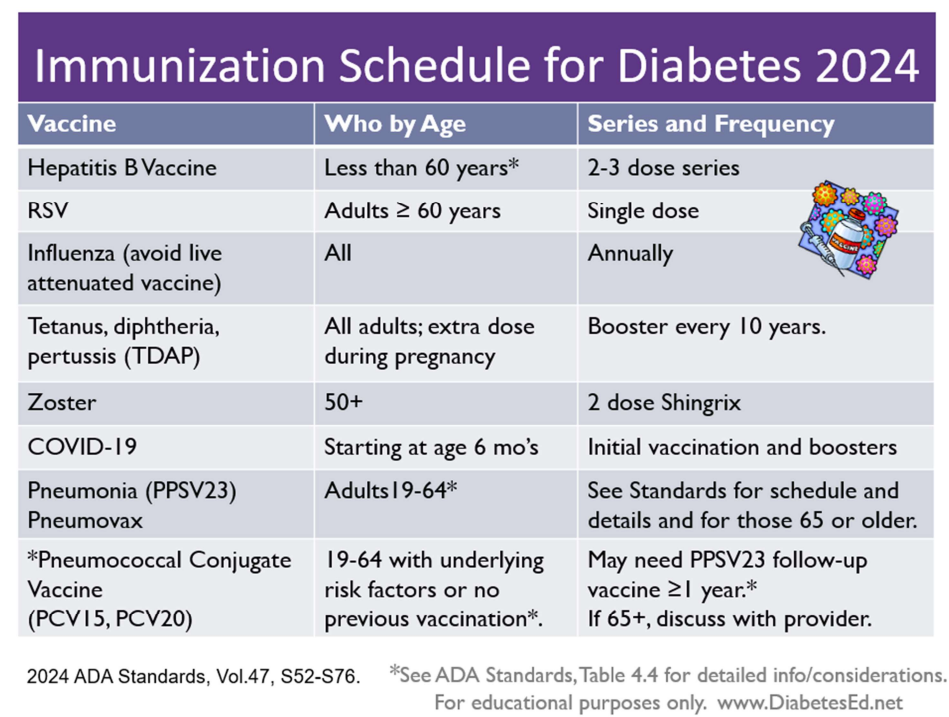With the publication of the ADA Standards of Care, Coach Beverly embarks on the yearly arduous yet rewarding task of updating our Cheat Sheet Library! This year, in addition to updating the content, we have simplified the “look” of our cheat sheet handouts. As part of the new CDR Accreditation requirements, handouts and slides used as part of the educational courses and resources have to be free of commercial bias and be “logo-free.” The CDR Accrediting Committee ensures that participants attending live or online training programs are presented with content free of conflict of interest, based on evidence, and without brands, ads, and logos.
We are proud to meet the rigorous standards set by the CDR Accreditation Committee and have a 25-year history of intentionally avoiding conflict of interest by not accepting contributions or funds from diabetes-related companies or industries and creating original materials.
Cheat Sheet Updates based on 2024 Standards
ADA Standards of Care 2, Diagnosis and Classification of Diabetes include additional details on screening for type 1 and type 2 diabetes and diabetes in pregnancy, which is captured in our Diagnosis and Classification Cheat Sheet. The diagnostic testing methods and criteria, remained the same as in past years, with an increased emphasis on using A1C as the preferred diagnostic tool, given its accessibility, greater convenience (fasting not required), greater preanalytical stability, and fewer day-to-day perturbations during stress, changes in nutrition, or illness.
Diagnosis and Classification Cheat Sheet Highlights.
- Screen for presymptomatic type 1 diabetes, by testing autoantibodies to insulin, GAD, islet antigen 2, or ZnT8 for those with type 1 phenotypic risk (younger age, ketoacidosis, etc.)
- For Type 2 diabetes, the suggested screening age for everyone starting at age 35 remained the same as did the BMI cut-off of 23 for Asian Americans and 25 for all others.
- Additional risk factors for earlier screening were added and a few were modified from last year. The elevated blood pressure cut-off was decreased from 140/90 to 130/80. In addition to regular screening for those taking antiretroviral medications, ADA added monitoring for hyperglycemia in those taking high-risk medicines (steroids, antipsychotic meds) or a history of pancreatitis and re-checking glucose levels annually or if any signs of hyperglycemia.
- In the diabetes and pregnancy section, the ADA more strongly recommended screening all women at the first prenatal visit to help detect undiscovered hyperglycemia and initiate early treatment. Before 15 weeks of gestation, test individuals with risk factors and consider testing all individuals for undiagnosed diabetes at the first prenatal visit using standard diagnostic criteria if not screened preconception.
Immunization Schedule for People with Diabetes 2024
This chart details the types of vaccines, when, and how often they are recommended for people with diabetes. There were two new additions this year. A single RSV dose is recommended for those 60 years and older and the COVID-19 vaccine and boosters are suggested starting at six months of age.
This standard emphasized reminding people with diabetes to avoid the live attenuated influenza vaccine and it included additional clarification on the pneumonia vaccines.
We hope you will stop by our complete
Cheat Sheet Complete Library!
Feel free to download and share these info sheets and share with colleagues and people living with diabetes!
ADA Standards of Care 2024 Webinar Update
Join us live on February 1, 2024, at 11:30 am PST

This course, updated annually, is an essential review for anyone in the field of diabetes. Join Coach Beverly as she summarizes the annual updates to the American Diabetes Association’s (ADA) Standards of Medical Care in Diabetes & provides critical teaching points & content for healthcare professionals involved in diabetes care & education.
Topics:
- A review of changes & updates to the annual ADA Standards of Medical Care in Diabetes.
- Identification of key elements of the position statement.
- Discussion of how diabetes educators can apply this information in their clinical setting.
Can’t make it live? No worries. We will send post the recorded version to the Online University within 24 hours of the broadcast
Instructor: Beverly Thomassian RN, MPH, CDCES, has been Board Certified in Advanced Diabetes Management for over 20 years. She is an Associate Clinical Professor at UCSF, a working educator, and a nationally recognized diabetes expert. She has a Master’s Degree in Public Health from UCLA, with a focus on behavioral health and education.
Sign up for Diabetes Blog Bytes – we post one daily Blog Byte from Monday to Friday. And of course, Tuesday is our Question of the Week. It’s Informative and FREE! Sign up below!
Accreditation: Diabetes Education Services is an approved provider by the California Board of Registered Nursing, Provider 12640, and our CPEU courses have received Prior Approval* from the Commission of Dietetic Registration (CDR), Provider DI002. Since our CPEU courses received Prior approval* from the CDR, these CPEU courses satisfy the CE requirements for the CDCES /BC-ADM regardless of your profession!
The use of DES products does not guarantee the successful passage of the certification exam. CBDCE and ADCES do not endorse any preparatory or review materials for the CDCES or BC-ADM exams, except for those published by CBDCE & ADCES.











